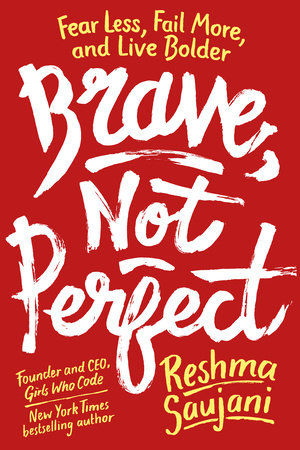Education
Learning To Be Brave, Not Perfect
Why failure is essential to living your best life—and making your best art.
Posted February 21, 2019
Earlier this month, Reshma Saujani, author and founder of the organization Girls Who Code, released a new book: Brave, Not Perfect: How to Fail More, Care Less, and Live Bolder. The book is an exhortation to women to slough off the expectations of perfection that we’ve had drilled into us all our lives and embrace a more “brave” mindset of being unafraid of mistakes and failure and working toward the lives we actually want.

Both perfectionism and bravery are central to the life of any writer or artist. And while Brave, Not Perfect is likely to particularly resonate with women, it has plenty of advice in it that all creative artists can find useful. Here are some highlights.
Harnessing the Power of “Yet”
If you want to know how a single word can make a difference, ask a writer. Saujani addresses the ways in which we talk about ourselves to ourselves—the blanket statements we make that can defeat and drag us down—like “I’m not a strong person,” “I don’t have what it takes to finish writing this novel,” or “I’m not good at making boundaries.” Referencing the work of psychologist Carol Dweck, Saujani encourages us to add “yet” to these statements—to turn a limiting box into the prelude to our success:
“I’m not a strong person…yet.”
“I don’t have what it takes to finish writing this novel…yet.”
“I’m not good at making boundaries…yet.”
What declarative statements are you using in your own self-talk that could turn into invitations to personal transformation with the addition of that simple three-letter word?
Asking, “And Then What?”
Many clients over the years have shared with me the fear that they will never finish the novel (or play or screenplay or memoir or…) that they’re writing. But layered under that fear is something far deeper:
Client: I’m afraid I will never get this project into a state I’m happy with.
Me: And if you never do? Then what?
Client: Then I’ll never be able to get it published/produced.
Me: And then what?
Client: Then all the time I’ve spent working on it will have been a waste.
Me: And then what?
Client: I won’t be able to see myself as a writer. I’ll lose that part of my identity.
Me: And then what?
Client: Everyone will see me as a failure and a loser. My life won’t have meaning. I don't know who I am.
Me: No pressure, right?!
This isn’t an exact transcript, but it illustrates how far the question “And then what?” can take you into a spiral of harsh judgment and lost purpose. If this resonates with you, I totally get why you feel this way—and it’s also no wonder that you’re struggling to write, with your very sense of self-hanging in the balance each time you sit down at your computer or notebook!
Forcing us to take our fears to their farthest conclusion by asking “and then what?” can serve to remind us that we may be getting carried away by them and help us to lighten that pressure load.
The next time you find yourself wallowing in your creative fears, write out dialogue like the one above and draw out your fear to its most extreme point. Then ask yourself whether the deep, dark, dramatic nadir of your fear is really a possibility and if even if the worst were to happen, if it would truly impact you the way you’re afraid it will. And then get back to work.
Asking, What scares me more?
Saujani talks with psychologist Adam Grant about what pushes creative people over the line from procrastination to action. Summarizing his words, she reports that “It’s the moment when the fear of failure is overtaken by the fear of failing to try.” Grant goes on to talk about “mental time-travel”—trying to look back at your current self from ten years down the road. “What will I weigh more heavily,” he proposes we ask ourselves, “the sting of failing, or the pang of what might have been?”
If you’re facing a difficult decision or looking for a push out of your procrastination, ask yourself, What would my future self—me ten years from now—say about this situation? What will my future self most remember from this life? If my future self could offer me one piece of advice, what would it be?

Columnist’s disclosure: I have worked with Saujani as the editor of Girls Who Code, her book for young readers. She has a short, compelling TED Talk that I encourage anyone to watch: Teach Girls Bravery, Not Perfection.




